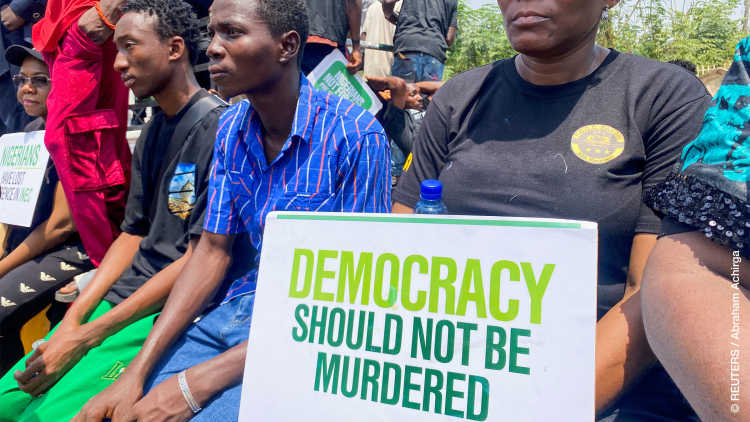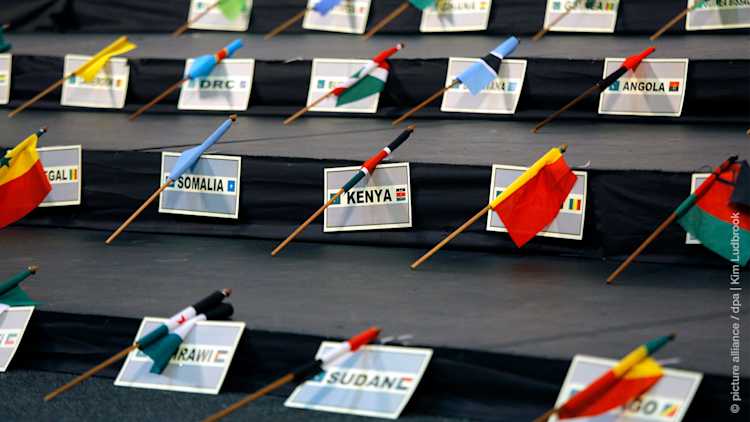- Startseite
- Publikationen
- GIGA Focus
- The Decline of Western Influence in Africa: Three Consequences
GIGA Focus Afrika
The Decline of Western Influence in Africa: Three Consequences
Nummer 4 | 2025 | ISSN: 1862-3603

Some 140 years after the infamous Berlin Conference, a new and different scramble for Africa is underway. Non-Western external actors such as China, Russia, and many Middle Eastern states have taken an increasing interest in Africa, leading to a decline of Western influence on the continent. What will be the consequences?
First, African governments already have a range of choices regarding their external partners. This increases their agency, which can foster more equal partnerships.
Second, the effects of a changing geopolitical landscape and Africa’s realignment in a multipolar world will also depend on their quality of governance. If governments do not promote democracy and sound development, the effects will be problematic – not least for respective domestic populations themselves.
Third, consequences will also materialise on the systemic level, and potentially include considerable risks of conflict when external actors support rival factions within African countries, as during the Cold War or presently in Sudan.
Policy Implications
Western countries including Germany will have to adapt to the new reality by acknowledging that there are key choices to be made going forwards: pursue self-interest in a transparent and ethical manner, prioritise long-term goals over urgency, select partners carefully, and attempt to better appreciate both own biases and African perceptions.
The New Scramble for Africa – A Decline of Western Influence
The year 2025 marks the 140th anniversary of the Berlin Conference of 1884–1885, a pivotal event in the “Scramble for Africa.” Today, a new such scramble appears to be unfolding – though one substantially different in form. While the late nineteenth century saw the height of European imperialism, with only the Ottoman Empire joining the Western colonial powers in Berlin, the present era is defined by the waning influence of Western powers. Following decades of dominance post-independence and especially after the Cold War, European countries and the United States now face rising competition from non-Western actors.
This reflects broader global shifts: a relative decline of Western influence and the ascent of powers from the so-called Global South. China’s expanding global role has left a significant mark on the African continent. Russia, absent after the fall of the Soviet Union, has reasserted itself. Emerging powers like Brazil and India are increasingly active, while neighbouring Middle Eastern countries – Iran, Qatar, Saudi Arabia, Turkey, and the United Arab Emirates – are expanding their footprint in this part of the world. Meanwhile, many African nations are asserting their own foreign policy agendas both within the region and globally.
This diversification of external actors has already eroded Western influence in Africa – a trend only likely to accelerate. Especially so amid the disruptive policies of the Trump 2.0 administration, such as suspending aid and provoking diplomatic conflict over unsubstantiated claims of a “White genocide” in South Africa. Trump’s scepticism of the transatlantic alliance threatens to further fracture and weaken the West.
The Trend: Increasing Diversity to Diplomatic, Economic, and Military Ties
“Influence” is commonly defined as one’s ability to make others agree with one’s own position in bilateral and multilateral settings. Moreover, the trend of a “West in decline” can be traced across three domains: diplomatic and political influence, economic engagement, and military cooperation. Political influence can come in very different guises. It is most readily observable by way of indicators such as agreements and treaties, state visits, and diplomatic presence. The first clear indication of increasing interest and influence are so-called Africa summits (Brosig 2021). While Western countries have been holding such summits for decades, countries like China, Russia, and Turkey have established their own related formats more recently. The latest iteration held in Russia’s second city St Petersburg included delegations from almost all sub-Saharan African (SSA) countries, with 14 heads of states also in attendance.
Diplomatic ties established with these and other non-Western powers also speak to this trend (Welz and Basedau 2025). Figure 1 below illustrates the number of embassies existing in the region between 1996 and 2023 for several leading external actors. Overall, four key Western countries increased their presence marginally from 151 embassies to 159; four core Global South actors – China, Russia, Saudi Arabia, and Turkey – had 95 embassies in the region in 1996 but had almost caught up with their Western counterparts in 2023 with 143, representing a 50 per cent increase. Russia’s strong but rather stable presence aside, China, Saudi Arabia, and Turkey have each opened numerous embassies on the continent in recent decades. China has established formal representation in almost all African countries and Turkey has almost quadrupled its diplomatic presence from a meagre 8 embassies originally to no less than 39 by 2023. Saudi Arabia’s numbers show an uptick from 14 to 23 embassies. Among Western countries, only the United Kingdom increased its number from 28 to 36, with a jump after it left the European Union. The numbers do not yet reflect developments in the Sahel and Trump 2.0’s new US African policy, both of which will likely further diminish the relative diplomatic influence of Western countries on the continent.
Figure 1. Number of Embassies for Select Western versus Non-Western Countries, 1996–2023

Source: Based on “Africa South of the Sahara,” compiled by Martin Welz (see Welz and Basedau 2025).
Note: Western states are France, Germany, UK, US; non-Western states are China, Russia, Saudi Arabia, and Turkey.
Voting patterns at the United Nations General Assembly indicate the substantial and growing independence of African countries in terms of their adopted positions on global conflicts. Several Western draft resolutions condemning Russia in the wake of its 2022 full-scale invasion of Ukraine were met with little enthusiasm by a number of SSA countries. Other such resolutions drew responses largely similar in nature. On average, more than 50 per cent of abstentions worldwide came from SSA nations – with a tendency for those who are close to China or Russia to be among them (Welz and Basedau 2025).
The West’s relative decline is also highly visible in economic terms. Trade patterns reflect the growing influence of non-Western actors in Africa. Especially through the Belt and Road Initiative and bilateral agreements, China has established a strong economic presence, having replaced Western countries as Africa’s top trading partner (Armstrong 2023). Between 2000 and 2020, African exports to China increased tenfold, while those to Saudi Arabia and Turkey also surged. In contrast, exports to the US dropped from USD 26.7 billion to USD 14 billion in the same time period. Western foreign aid, at least before its suspension by the current Trump administration, remains highly significant but has become more selective, while other donors, particularly China, have caught up. For instance, German official development aid to Africa, depending on the means of counting, has amounted to close to USD 5 billion per year since 2020 (OECD 2025), while the figure for China’s went from USD 0.63 billion in 2003 to USD 3.18 billion as of 2021 (China Africa Research Initiative 2023). The latter numbers do not account for loans and undisclosed support. Likewise, Saudi Arabia and others have also expanded their aid, though data remain hard to come by.
Cultural influence often accompanies diplomatic and economic ties. While Western cultural exports continue, China emphasises non-interference – yet has established 74 Confucius Institutes in 47 African countries (Confucius Institute 2024). Meanwhile, Middle Eastern states like Qatar and Saudi Arabia have invested heavily in spreading their versions of Islam, with unconfirmed links to jihadist movements in SSA (Welz and Basedau 2025).
Hard power eventually comes down tomilitary cooperation, ranging from arms sales, to agreements, to the presence of “advisors” or even outright intervention, sometimes in the form of permanent military bases. Non-Western military engagement in Africa is rising while the West’s, and particularly France’s, declines. China opened its first military base in Djibouti in 2016 and is considering establishing another in the Gulf of Guinea, while also becoming increasingly involved in UN peacekeeping operations. Russia has a far greater military presence, supplying 38 per cent of Africa’s arms in 2020; for comparison, the US (16 per cent), France (14 per cent), and China (9 per cent) all fell well below that figure (Jones et al. 2021: 22). By 2022, Russia had military-cooperation agreements with nearly 30 African governments (Olech et al. 2022). Its direct presence has frequently seen semi-regular military personnel stationed in Burkina Faso, the Central African Republic, Mali, Mozambique, and Sudan. What is now mainly known as the “Africa Corps” was created in 2023 and 2024, and is directly controlled by the Russian Ministry of Defence (it is not simply a rebranded version of the (formally) private military company “Wagner,” which continues to by and large exist on its own). Other countries that have a role in military cooperation with the African continent include India, Israel, Qatar, Saudi Arabia, Turkey, and the UAE, sometimes backing warring factions in conflicts like those witnessed in Ethiopia and Sudan.
While Western powers’ military presence remains significant, it is waning. The recent coup wave in West Africa and the Sahel saw Western troops withdraw – if not be expelled – from Burkina Faso, Mali, and Niger. Chad and Côte d’Ivoire have both announced the departure of French forces, reducing the European country’s military bases on the continent to Djibouti and Gabon – the latter having already been converted into a joint training centre. While France seems to have re-established improved relations with the Central African Republic, now “sharing” influence with non-Western actors, it is no exaggeration to state that these developments mark a watershed moment in its Africa policy.
Summing up, evidence of the rise of non-Western countries and a corresponding Western decline is clear. Yet, such an assessment requires nuance. Western presence is not waning across the board in absolute terms; it is rather that increasing competition creates relative decline. It varies according to field and country, as do the strategic choices of both Western and non-Western external actors. For instance, China excels mostly in the economic sphere and tends to not directly intervene in African affairs. In contrast, Russia has a stronger military footprint based on opportunism. Unstable countries are preferentially targeted, offering troubled regimes military backing in exchange for natural resources and diplomatic support. Moreover, African governments are no mere subjects of outside influence. The African Union’s membership in the G20 also indicates the continent’s growing influence. Moreover, these countries pursue their own and varied, partially competing, foreign policies, as also shaping the contours of international politics in the region.
Three Consequences: The Good, the Bad, and the Ugly
What repercussions can be expected? In short, three effects have partially already materialised, and are likely to occur with increasing frequency going forwards. They differ in their nature and the challenges they pose, both for Africa and Africans and Western actors.
The Good: African agency increases
The diversification of external actors provides African governments with more choice on who to cooperate with, which increases African agency and facilitates the “equal partnerships” frequently cited in official statements. From this angle, Western countries should welcome the trend – or at least get used to it. Having a range of options makes African actors not only more independent but may also generate positive effects, for instance in terms of trade. Cooperating with non-Western partners is also a common practice of Western countries. Germany has been trading with China as a preferential destination. Germany had imported large amounts of energy from Russia prior to the latter’s full-scale invasion of Ukraine. However, Germany’s dependence on Russian energy exports represents a cautionary tale for African countries. They should avoid new dependencies and keep their options open. But let us face the truth: it remains African governments’ own choice, and no Western country should lecture them on who they should cooperate with. In short, Western countries must either get used to what is afoot or try to make things better by offering up a more attractive proposition.
The Bad: Support will increase for governments, not necessarily people
Yet, increased agency mainly lies with African governments and not necessarily with their domestic populations. It therefore will depend on the nature of incumbents’ rule as to what use they make of having increased choices. Not all governments are alike, and more support for them does not represent good news for Africans if public goods such as prosperity, health, equality, security, and human rights suffer in consequence. Some of the continent’s regimes have been notorious for channelling resources into policies that benefit leaders in terms of own power and wealth. Hence, countries with records of good governance like Botswana or Ghana will gain; greater leverage and more resources being able to countries like Chad, Equatorial Guinea, Eritrea, or Zimbabwe will see human rights abuses and poverty only continue – if not increase.
Now, well-meaning European and Western governments might reconsider the urge to make “better offers,” especially when such deals potentially trump concerns about African citizens’ own interests as well as long-term goals like the stability of these countries themselves. Big picture and values-based aspirations such as stability, prosperity, and human rights are not easy to reconcile with maximising “influence,” access to strategic resources, or cooperation on controlling migration flows. The latter goals require working with governments that might not readily align themselves with principled policy choices. Sometimes, more values-based goals clash: if external actors want to resolve conflicts or alleviate humanitarian suffering in a given country, cooperation with particular governments is a must.
To be clear, Western countries have never pursued an exclusively values-based approach. The opposite was largely true during the Cold War and, despite official rhetoric suggesting otherwise, they have on occasion sacrificed more noble goals and cooperated with “bad” governments for pragmatic reasons. We should avoid perpetuating the self-serving but unrealistic image of Western powers’ foreign policy goals always being selfless. Yet, the basic imperative seems straightforward: more competition increases incentives for “better offers,” namely seeking to outbid competitors by proposing deals that are the most attractive to African counterparts. Western actors must be aware of contradictory goals and make well-informed and strategic choices over what to prioritise in such cases.
The Ugly: External actors’ rivalries fuel conflict
The third effect arguably constitutes the scariest one, having its precedent in the events of the Cold War era. The diversification of external actors and the growing confrontation between Western and non-Western actors – or within these camps – may extend to Africa. In this sense, competition may turn ugly. Rival support for African governments as allies, partners, or suppliers of critical resources may fuel conflict between different factions within SSA countries. During the Cold War, assistance for “allies” intensified and prolonged conflicts in countries such as Angola, Mozambique, and Zaire (the Democratic Republic of Congo). There were also conflicts between pro-Soviet and pro-Chinese factions. In the Republic of Congo, France and the US favoured and assisted different factions in the civil war of 1997–1999 – with its pro-French leader eventually emerging victorious and still ruling the country to this day. In the Libyan civil war erupting after the fall of Muammar Qaddafi, France and Italy reportedly backed opposing factions.
The new scramble for Africa is already fuelling further conflicts, albeit ones sometimes not involving Western actors. The bloody civil war raging in Sudan since 2023 has seen its warring factions be supported by different external actors. While the military government has been backed by Russia and Turkey, the UAE has been accused of delivering arms to its domestic rival. In Mali, Ukrainian special forces were reportedly involved in an ambush on government troops and Russian mercenaries. In the Ethiopian conflict over Tigray, the government has received external assistance from Turkey and the UAE, which may have added to the high number of casualties witnessed. According to renowned sources like the Uppsala Conflict Data Programme, more than 300,000 people perished in Ethiopia – with extensive one-sided violence perpetrated against civilians there (UCDP 2025).
Table 1. The Diversification of External Actors and Recommendations for Africa Policy
Likely Effects for African countries | Recommendation for Western governments | |
The Good | Increased partner choices -> more African agency | Accept and manage reduced influence and consider making “better offers” to African partners |
The Bad | All governments will have more agency -> negative effects for human rights, development, and stability where bad governance prevails | Set priorities on goals and who to support; avoid “camp thinking” and make “do no harm” a guiding principle |
The Ugly | External rivalries may create or escalate internal conflict in Africa -> more violent conflict | “Do no harm”: Avoid “camp thinking” and providing assistance to conflict parties; focus on conflict resolution and prevention |
Source: Author’s own compilation.
While this third effect holds the biggest potential to do damage, Western countries can relatively easily avoid it. Namely, by focusing on conflict resolution – if not prevention – rather than falling into the trap of “camp thinking.” Western actors should also be aware that there is no cohesive and united block of the “Global South” within or across regions; the same is true for a “West in decline.” Within Africa, governments and countries have their own interests – as shaped by, but not limited to, historical legacies like colonialism. These concerns include active and often complex regional policies, sometimes involving direct tensions, as seen in the dispute between Rwanda and the DRC over the former’s alleged backing of the M23 rebel group. A peace accord, brokered by Qatar and the US, was signed in June 2025, which points to the brighter side of external involvement. This exemplifies how both Western and non-Western engagement can help prevent adverse outcomes.
Policy Challenges: Africa Policy Is Not a Wish List
Africa policy does not, as such, constitute a wish list. Competing strategies, conflicting goals, limited resources, and unpredictable side-effects are persistent realities. A realistic outlook on constraints is imperative. Idealism may be well-intentioned, yet such objectives often mask underlying interests, stretch beyond available resources, and lack clear pathways to implementation. Take a united Western or even an EU Africa policy: though widely favoured and certainly desirable, it has rarely fully materialised and remains difficult to achieve. Especially so with Trump 2.0, whose recent actions have fractured Western cohesion on climate policy and the rules-based international order. What, then, might a realistic Africa policy look like? Ultimately, it depends on identifying which goals to pursue, how best to do that, and, when conflicts arise, what to prioritise. While a flawless master plan is a chimera, a number of less ambitious but ultimately more achievable ideas can be proposed here.
Own interests are no crime – most of the time
Policy papers frequently juxtapose interests and values, regularly suggesting the latter need to be prioritised. However, we might need to rethink self-interest. First, it is nothing out of the ordinary, from the individual to the governmental level; everyone pursues it to some degree. Second, own interests are a truthful anchor of policy. If a government is open about them, accusations of hypocrisy become less likely. Proclaimed goals and actual policy will diverge less. Third, self-interest is not inherently achieved at the expense of partners, only if pursued in a harmful manner. Self-interest does not constitute a free pass for unethical behaviour, meaning restraint is in order. If partners’ respective interests differ, compromise and trade-offs are always options. An incomplete list of Western goals will certainly include access to raw materials and migration control. It may extend to political stability and combatting terrorism to avoid contagion or forced migration. At this point, the lines between (own) interests and values become blurred. Political stability or peace will also benefit African and Western partners. Prosperity is good for Africans, and wealthier African countries also make better trading partners. Climate policies will, similarly, benefit the planet and all those who live on it.
When diverging goals are not fully compatible, one must make choices. Promoting environmental sustainability and labour rights in value chains may not always be perfectly in line with securing access to critical resources or foreign trade in general. Cooperation may be required with regimes that pursue policies contrary to German or European interests. Beyond being transparent about one’s self-interest and related tensions, focus on those goals that benefit all partners best is the most viable way forwards. This will entail remaining realistic about to what extent they can be easily achieved and what issues may arise in consequence. Stay fair in the process of pursuing them. Self-interest, however, should not be mistaken for only narrow and short-term enrichment.
Prioritise long-term goals over urgency
Before the general elections of early 2025, the German government approved the new “Africa Policy Guidelines” (Auswärtiges Amt 2025). This extremely valuable document integrates the most important aspects of what has been discussed, not least accompanying challenges and limitations. Yet, the guidelines do not claim to represent a strategy per se. A clear vision on what goals to prioritise, especially when they are in conflict with one another, and a detailed plan on how to allocate resources and which diplomatic instruments to apply to these ends are paramount. Another important element hereof is that it must be embedded in the – also largely lacking – national foreign policy strategy of the federal government.
A few core considerations will return potentially huge benefits: the key advantage of strategy is to prioritise ultimate need over urgency. Many institutions – governmental and academic ones being no exception – tend to react to the latest crisis rather than play the long game. If overarching goals and preferred instruments are clearly defined, decision makers can better react to crises. They will come as less of a surprise if scenario-modelling, foresight, and trend analysis are in place. Such instruments are no superfluous academic exercise but an integral part of strategic calculations if we are not to be caught unprepared.
Coherence is another key element that can be addressed at the unilateral level. There is no such thing as a completely monolithic government, but one may strive to reduce the dualism(s) between different ministries and other government agencies that pursue their own goals, make potentially redundant expenditure on the same instruments (such as forecasting), or follow institutional self-interest over the good of the country. In this case, such dynamics on the part of decision makers and bureaucracies are indeed harmful. Relatedly, one should evaluate the actual effectiveness, if not efficiency, of instruments such as those supporting development cooperation (Lay 2025).
Why not be picky about partners?
While foreign policy often seems based around maximising influence, or at least good relations with many partners, we need to acknowledge that overall interest in Africa and the resources available to engage with it are limited (Grauvogel 2023). The “Global North” counts more for Germany, as evident for instance in the latest coalition agreement (CDU, CSU, and SPD 2025). The 144-page document only contains one and a half paragraphs on Africa. “Africa” or “African” are mentioned only eight times. Trade with Africa has also been marginal: only 2 per cent of Germany’s is with its respective countries. Maximising influence via broad engagement will also inevitably lead to the stabilisation of regimes that neither serve their own citizens’ interests nor Germany’s different long-term goals. When working with and supporting regimes with a questionable record in terms of human rights and development this will eventually backfire, not least in terms of acute reputational damage.
One solution can be called “constructive and selective disengagement.” German foreign policy should strive to prioritise quality over quantity regarding partnerships (Maihack 2025). One can think of several levels hereto, namely pursuing the maximum degree of cooperation where self-interest and values-based goals align best. That means to favour democratic governments and those implementing promising policies over collaborating with corrupt dictatorships. This idea is not exactly new: the COMPACT with Africa favours cooperation contingent on good governance. Contrary to public perception, some African countries conform to such characteristics. This policy might pay off in the long run.
Reflection on sources of bias will improve foreign policy
History provides rich evidence of how misperceptions and misconceptions give rise to errant foreign policy – in short, by way of all kinds of cognitive biases. Besides creating safeguards against delusion and groupthink, an important bias to avoid is, as discussed above, “camp thinking.” Especially after the events of February 2022, many Westerners entered the “mental war path” and began to perceive Africa policy primarily through the lens of the conflict with Russia while overlooking how this war was considered less relevant by many African governments (Plagemann and Maihack 2023). As things stand, Russia and possibly other non-Western countries are opponents. The new federal government’s coalition agreement explicitly stipulates the goal of “pushing back against Chinese and Russian influence in Africa.” However, global conflicts should not dictate foreign policy in all respects, as during the Cold War era. Seeing “enemies of enemies” as “friends” might lead one to assist questionable governments and fuel conflict on the continent.
At the same time, one must not be naive: awareness of what informs the perceptions and related strategies of states inside and outside of Africa is essential. “Bias control” should therefore be practised across the board as regards ongoing sources of favouritism and resentment. China’s and Russia’s foreign policies seem informed by, if not obsessed, with status – as, at least in the latter case, combined with entrenched anti-Western sentiment. Lately, discussions have started to study and counter “Westernphobia.” This will necessitate reflect on the roots of such hostility, as often but not exclusively informed by the experience of colonisation or erstwhile support for authoritarian regimes, including in this context the racist Apartheid regime in South Africa. Self-reflection is not only important to develop sensitivity regarding the perceptions of partners inside and outside of Africa – it is also crucial and potentially highly useful when designing one’s own foreign policy.
Fußnoten
Literatur
Armstrong, Martin (2023), China’s African Trade Takeover, Statista, 25 January, accessed 30 November 2024.
Auswärtiges Amt (2025), Shaping Partnerships Together in a Changing World. Federal Government’s Africa Policy Guidelines, 8 January, accessed 1 June 2025.
Brosig, Malte (2021), Africa in a Changing Global Order: Marginal but Meaningful?, London: Palgrave MacMillan.
CDU, CSU, and SPD (2025), Verantwortung für Deutschland. Koalitionsvertrag zwischen CDU, CSU und SPD, 21. Legislaturperiode, 6 May, accessed 15 May 2025.
China Africa Research Initiative (2023), Data: Chinese Global Foreign Aid, Johns Hopkins University’s School of Advanced International Studies, accessed 10 October 2023.
Confucius Institute (2024), The CI Worldwide, accessed 15 February 2024.
Grauvogel, Julia (2023), Afrika als Leerstelle in der Nationalen Sicherheitsstrategie?, GIGA Focus Africa, 6, Hamburg: German Institute for Global and Area Studies (GIGA), accessed 12 August 2025.
Jones, Seth G., Catrina Doxsee, Brian Katz, Eric McQueen, and Joe Moye (2021), Russia’s Corporate Soldiers: The Global Expansion of Russia’s Private Military Companies, Center for Strategic and International Studies, 21 July, accessed 17 January 2025.
Lay, Jann (2025), Kein Rückbau, kein “Weiter so“: Eine neue starke Entwicklungspolitik, GIGA Focus Africa, 2, Hamburg: German Institute for Global and Area Studies (GIGA), accessed 12 August 2025.
Maihack, Henrik (2025), Afrikapolitik nach der Bundestagswahl. Fünf Ideen, Friedrich-Ebert-Stiftung, March, accessed 28 July 2025.
OECD (2025), ODA Trends and Statistics, accessed 28 July 2025.
Olech, Aleksander Natalia Matiaszczyk, Leon Pińczak, and, Jan Sobieraj (2022), The Military Involvement of the Russian Federation in Africa. Contracts and Agreements Signed, Institute of New Europe, 23 May, accessed 10 January 2025.
Plagemann, Johannes, and Henrik Maihack (2023), Wir sind nicht alle: Der Globale Süden und die Ignoranz des Westens, München: C.H. Beck.
UCDP (Uppsala Conflict Data Program) (2025), UCDP Conflict Encyclopedia, Uppsala University, 15 May, accessed 12 August 2025.
Welz, Martin, and Matthias Basedau (2025), Autocratization and External Actors in Africa: Regional Trends and the Case of Mali, Mimeo.
Redaktion GIGA Focus Afrika
Lektorat GIGA Focus Afrika
Regionalinstitute
Forschungsschwerpunkte
Wie man diesen Artikel zitiert
Basedau, Matthias (2025), The Decline of Western Influence in Africa: Three Consequences, GIGA Focus Afrika, 4, Hamburg: German Institute for Global and Area Studies (GIGA), https://doi.org/10.57671/gfaf-25042
Impressum
Der GIGA Focus ist eine Open-Access-Publikation. Sie kann kostenfrei im Internet gelesen und heruntergeladen werden unter www.giga-hamburg.de/de/publikationen/giga-focus und darf gemäß den Bedingungen der Creative-Commons-Lizenz Attribution-No Derivative Works 3.0 frei vervielfältigt, verbreitet und öffentlich zugänglich gemacht werden. Dies umfasst insbesondere: korrekte Angabe der Erstveröffentlichung als GIGA Focus, keine Bearbeitung oder Kürzung.
Das German Institute for Global and Area Studies (GIGA) – Leibniz-Institut für Globale und Regionale Studien in Hamburg gibt Focus-Reihen zu Afrika, Asien, Lateinamerika, Nahost und zu globalen Fragen heraus. Der GIGA Focus wird vom GIGA redaktionell gestaltet. Die vertretenen Auffassungen stellen die der Autorinnen und Autoren und nicht unbedingt die des Instituts dar. Die Verfassenden sind für den Inhalt ihrer Beiträge verantwortlich. Irrtümer und Auslassungen bleiben vorbehalten. Das GIGA und die Autorinnen und Autoren haften nicht für Richtigkeit und Vollständigkeit oder für Konsequenzen, die sich aus der Nutzung der bereitgestellten Informationen ergeben.























